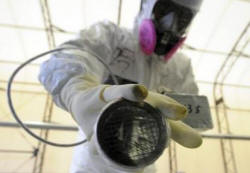|
 Fukushima-related
child cancers unlikely to rise: IAEA Fukushima-related
child cancers unlikely to rise: IAEA
 Send a link to a friend
Send a link to a friend
[September 01, 2015]
By Louis Charbonneau
UNITED NATIONS (Reuters) - An increase in
thyroid cancer among children is unlikely after the meltdown at Japan's
Fukushima nuclear plant four years ago, but it remains unclear exactly
how much radiation children in the vicinity of the plant were exposed
to, the United Nations' nuclear watchdog said in a report released on
Monday.
|
|
 Increased thyroid cancer is generally the leading health concern
after exposure to nuclear radiation, but that may not be the case
after the accident at Tokyo Electric Power Co's Fukushima Daiichi
plant in March 2011, the Vienna-based International Atomic Energy
Agency said. Increased thyroid cancer is generally the leading health concern
after exposure to nuclear radiation, but that may not be the case
after the accident at Tokyo Electric Power Co's Fukushima Daiichi
plant in March 2011, the Vienna-based International Atomic Energy
Agency said.
"Because the reported thyroid doses attributable to the
accident were generally low, an increase in childhood thyroid cancer
attributable to the accident is unlikely," the report said.
"However, uncertainties remained concerning the thyroid equivalent
doses incurred by children immediately after the accident," it
added.

Those uncertainties are largely due to a lack of reliable personal
radiation monitoring data immediately after the accident, which
released radioiodine and other radioactive materials into the
environment, the report said.
In the case of Fukushima, the earthquake and following tsunami cut
off power to the plant and made emergency response measures
difficult, if not impossible, to implement.
Adding to the uncertainty was the fact that the administration of
"stable iodine" to protect children's thyroid glands was not done
uniformly at the time, "primarily due to the lack of detailed
arrangements," the report said.
Detailed screening of children's thyroid glands is being undertaken
now in Japan as part of a survey aimed at the early detection and
treatment of diseases.
The report highlighted areas where improvements were needed in the
wake of the Fukushima accident. The IAEA said more sustainable
solutions were needed for the management of highly radioactive water
and radioactive waste being collected at the plant, "including the
possible resumption of controlled discharge into the sea."
[to top of second column] |

It added that countries should prepare detailed scenarios and train
workers for coping with worst-case natural disasters, including
situations where more than one disaster is combined with a nuclear
accident. They should also plan for clean-up operations in the wake
of such incidents.
The report also called for strengthened international cooperation in
the event of such accidents.
Japan began encouraging residents to return to homes 12 miles (19
km) from the plant last year, but many residents have mixed feelings
about returning to abandoned towns.
(Reporting by Louis Charbonneau; Editing by Bill Rigby)
[© 2015 Thomson Reuters. All rights
reserved.] Copyright 2015 Reuters. All rights reserved. This material may not be published,
broadcast, rewritten or redistributed.

 |